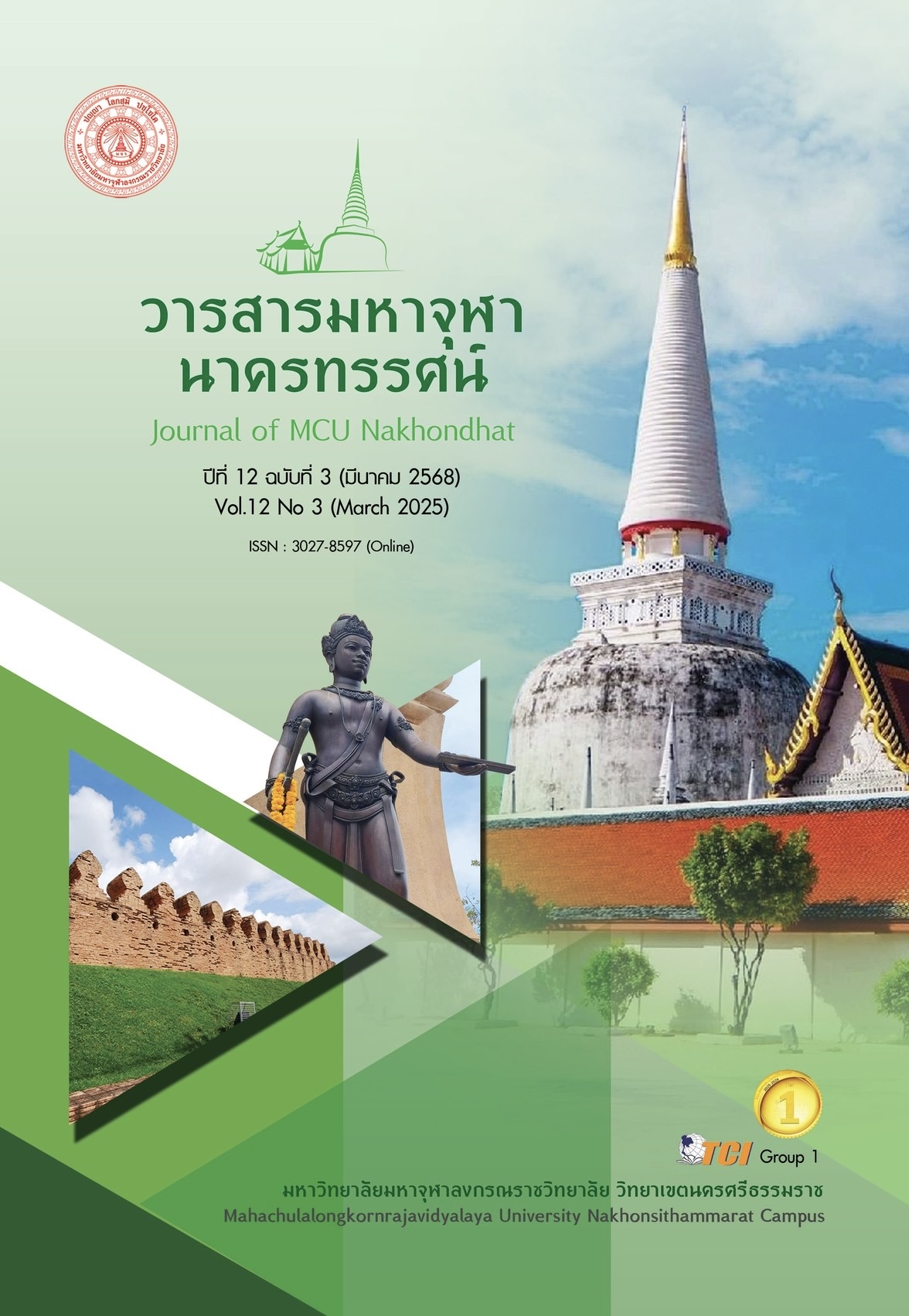DEVELOPMENT OF EXECUTIVE FUNCTIONS FOR EARLY CHILDHOOD IN NAKHON SI THAMMARAT BORDER PETROL POLICE SCHOOL WITH TOYS MADE FROM LOCAL MATERIALS
Main Article Content
Abstract
The objectives of this research paper were 1) To study the Ban Khao Wang community in terms of ecology, history, and local wisdom, 2) To develop an EF brain skills curriculum using toys from local materials, and 3) To develop an EF brain skills curriculum using toys from local materials. Create a learning network that is appropriate for the child's development and the context of the community. The sample group is as follows: 8 villagers 3 community leaders, 3 village sages and 12 early childhood children. Selected by a specific method (Purposive Sampling) and voluntarily participated in the activity. Research tools include questionnaires, in-depth interviews, workshop materials, satisfaction assessments, and other materials. The data collection is divided into 3 phases: 1) Basic Data Study, 2) Curriculum Development, and 3) Curriculum Development. Evaluation of curriculum development using basic statistics to analyze data such as mean () and standard deviation (S.D.) The results showed that: 1) The Ban Khao Wang community has outstanding ecological characteristics such as important watersheds, streams, and natural resources that are conducive to traditional living. The community still maintains local wisdom through the use of natural materials in their livelihoods. 2) The EF Brain Skills Course for Early Childhood consists of a good food unit, our community, loves Thailand, toys, and fun with numbers, and 3) the curriculum evaluation shows that the overall average (
= 2.58), basic skills (
= 2.65) and self-directed skills (
= 2.50) are at a high level, reflecting the suitability of the curriculum in developing EF brain skills of early childhood in the context of the Ban Khao Wang community effectively. Additionally, the establishment of a learning network strengthens the community and promotes the exchange of knowledge between community members and researchers.
Article Details

This work is licensed under a Creative Commons Attribution-NonCommercial-NoDerivatives 4.0 International License.
References
Bronfenbrenner, U. (1979). The ecology of human development: Experiments by nature and design. Cambridge: Harvard University Press.
Chaiyajit, S. (2020A). The impact of local materials on developing EF skills in preschool children. Journal of Early Childhood Education, 10(2), 34-45.
Chaiyajit, S. (2020B). The impact of technology on early childhood development in rural areas. Journal of Educational Development, 12(3), 45-60.
Diamond, A. (2013). Executive functions. Annual Review of Psychology, 64(1), 135-168.
Green Globe Institute. (2022). Ban Khao Wang Community: Sustainable development through agroforestry restoration and check dam construction. Retrieved March 20, 2025, from https://www.greenglobeinstitute.com/Frontend/Content.aspx?ContentID=4d1b26f5-e3f3-4f75-8170-68d930a8859f
Mektrairat, W. & Khongkaew, P. (2021). The development of a parental training curriculum to enhance executive function (EF) skills in early childhood at child development centers under local administrative organizations in Krok Phra District, Nakhon Sawan Province. Journal of Graduate Studies of Northern Rajabhat University, 11(2), 15-30.
Mektrairat, W. & Khongkaew, P. (2022). The role of parents in developing executive function (EF) skills in early childhood during the New Normal situation. Journal of Graduate Studies of Northern Rajabhat University, 12(1), 17-34.
Ministry of Education. (2018). Framework for early childhood education development. Bangkok: Office of the National Education Commission.
Office of the National Economic and Social Development Council. (2018). National strategy 2018-2037. Bangkok: NESDC.
Schunk, D. H. (2020). Learning theories: An educational perspective. (8th ed.). London: Pearson Education.
Wongprasert, P. (2019A). The effects of excessive technology use on social and cognitive skills in preschool children. Journal of Early Childhood Studies, 10(1), 30-50.
Wongprasert, P. (2019B). The effects of local materials on early childhood EF development. Journal of Early Childhood Research, 10(2), 45-60.


